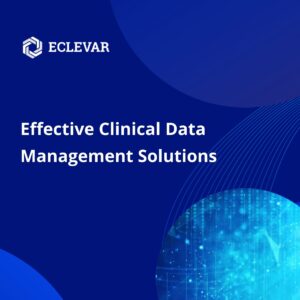What are the effective solutions for Clinical Data Management?
For the health care of patients around the world, any new medical product (or different uses of an already established technology) must complete clinical trial procedures to ensure safety and quality. Bringing new solutions to the market is a complex process and consists in the application of several determinate activities, one of those is Clinical Data Management.
CDM is responsible for inform and statistically interpretate sound data, collected through trials, for the reduction of time between development and marketing, while following regulatory standards for production. Throughout the entire clinical trial stages, CDM is involved.
For the matter of importance related to the subject, it is essential to understand Clinical Data Management, as well as know how to rely on partnerships that can provide experienced analytical personnel to help move your product forward in the medical industry.
What is Clinical Data Management?
The medical and pharmaceutical market, today, demands fast approaches to the distribution approval process, at the same time that expects high standards for the new products. Clinical Data Management is the portion of the process that makes easier delivering both. Early in the trial process, soon after a protocol is established, CDM activities start by designing the strategy for collecting high-quality data and meet regulatory requirements.
The true goal of CDM is to assemble concrete data to support the claims of a medical or pharmaceutical technology, leading to a positive conclusion to its safety and effectiveness. Though the entire research period, the data management team must guarantee that all data is collected, validated, complete and consistent.
Many roles are included in CDM activities, they are assessed for quality, at regular intervals, during a trial. You will learn more about those aspects in this article.
• Data Managing
• Database Programming
• Design
• Medical Code
• Clinical Data Coordinating
• Quality Control
• Data Entry
How do we define “high-quality” data?
To say a collection of data is “high-quality” is a matter of accuracy and statistical analysis, what means two things: first, data should never be lost, and if it is, the number must be minimal; and second, in order for data to be considered high-quality, it should exhibit a level of variation that is deemed acceptable and does not impact the study’s conclusion or statistical analysis.
That being said, in some situations, results that aren’t in conformity with the expected can also be of value for regulatory authorities.
Regulations, Guidelines, and Standards in Clinical Data Management
CDM follow guidelines and standards, similarly to other areas in clinical research, to ensure the integrity, authenticity, and confidentiality of data. Compliance with 21 CFR Part 11 is essential for electronic records, which are created, modified, maintained, archived, retrieved, or transmitted. Validated systems are used to ensure data accuracy, reliability, and consistency, accompanied by secure, computer-generated, timestamped audit trails.
The Society for Clinical Data Management (SCDM) published the Good Clinical Data Management Practices (GCDMP) guidelines, consisting of 20 chapters that outline minimum standards and best practices for CDM processes. These instructions serve as a valuable resource for maintaining high-quality data management practices.
The CDM roles in Clinical Trials
All key aspects and activities of Clinical Data Management involves the efficient and accurate handling of the information extracted from practical studies. The CDM process consists of:
Data collection
The team designs and implement collecting strategies, that are often incorporated into electronic data capture (EDC) systems. They determine the types of data to be gathered, develop case report forms (CRFs), and choose data entry guidelines.
The CRF should be concise, self-explanatory and user friendly. This document must record all information on each patient/subject enrolled in a clinical research study.
CRF tracking
The CRF entries will be monitored and handed over to the CDM team, that is responsible for check them for missing pages and lost data.
Data Entry and Validation
Managers oversee the entry of data into the designed systems, using validation checkmarks and resolving discrepancies, to make sure it is accurate.
Database Designing
Clinical software applications can be used to facilitate the CDM tasks. These tools are not difficult to use and have compliance with regulatory requirements. Study details like objectives, intervals, visits, investigators, sites and patients are used to validate data when incorporated into the software for tests, before moving them to the real data capture.
Discrepancy management
CDM review discrepancies and investigates possible reasons for them. They are also the ones who gather documented evidence for resolving the problem. The review is performed at regular intervals to ensure that them have been fixed. This is a very important task and must be done with maximum attention.
Medical coding
It is important to identify and classify the medical terminologies associated with the clinical trial, and medical coding can help with that task. Using electronic medical dictionaries and knowledge of disease entities, drugs used, and the pathological processes involved, medical terms applied on the CRF can be detected and ordered to achieve data consistency and avoid unnecessary duplication.
Database locking
After undergoing a thorough quality check and assurance process, the final data validation takes place in consultation with the statistician. Once any discrepancies are resolved, the SAS datasets are finalized.
It is essential to complete all data management activities prior to locking the database, which is confirmed through a pre-lock checklist. The database lock ensures that no further changes can be made to the data. Once the database is locked, clean data is extracted for statistical analysis, and the final database is archived accordingly.
Trust Eclevar as your Clinical Data Management team
CDM is a vital part of any clinical study, and for that reason it must be conducted by specialists. Eclevar is an experienced CRO with extensive knowledge in regulation and performance of a clinical trial. Our team is ready to perform under your specific research, data and documentation needs to put your product closer to your target markets.
We are committed to verify and protect access to the data collected, complying with our Protection & Privacy Policy. For more information on Clinical Data Management and how we can work together, contact us.

